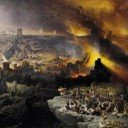The fourth bowl, just like the previous bowls presented, contains both a potential literal, physical application as well as a spiritual and Covenantal application as well. And just like the previous bowls there appears to be a connection to the corresponding trumpet judgment.
In this case, though, the correspondence appears to look like an opposite until one seriously considers the consistent Biblical symbolism employed by John in the book of Revelation. In the fourth trumpet we see the celestial beings, the sun, moon and stars, going dark, while in this fourth bowl we see the power of the sun increased. But what we will find, like the previous bowl judgments, is that there is a “reversal” of Covenantal benefits in view.
Rev. 16:8-9 The fourth angel poured out his bowl on the sun, and it was allowed to scorch people with fire. [9] They were scorched by the fierce heat, and they cursed the name of God who had power over these plagues. They did not repent and give him glory.
While the fourth trumpet shows the sun going dark, here we see the intensification of the sun causing scorching. This scorching is actually a promised result of Covenantal Unfaithfulness found in Deuteronomy 28.
Deut 28:22 The LORD will strike you with wasting disease and with fever, inflammation and fiery heat
So, here we have the spiritual, covenantal result of the unfaithful covenant breaking by Israel. This promised result is amplified in the book of revelation and again directed at Israel, the only nation that could receive the punishment of Covenantal Unfaithfulness.
This also reverses the blessing of God found in covering and protecting His people. This is found in the cloud that covered the children of Israel in the wilderness and the concept of God’s continuing to act as a refuge from the “destruction of the noonday” in the Psalms.
But taking a look at how celestial beings are used as symbols throughout the Scriptures may give us another potential interpretation of this passage. If the reader recalls, we previously noted that the sun quite often represents a nation or the king of that nation. When the sun is rising on a nation it is said to be in it’s glory, but when the sun fades it is seen as the end for that nation.
Here we have the nation of Rome that is seen as so oppressive and overbearing that it is like it is scorching it’s enemies. To Israel, the sun of Rome is a scorching, blistering machine of oppression. This oppression comes from the rulers of that nation and is set against it’s enemies like the sun scorching the earth. It is inescapable.
Finally, it should be noted that it is quite common for temperatures to be impacted by the actions we know took place in the siege of Rome. With the destruction of the vegetation and the polluted waterways, it would most certainly impact that natural temperate climate of the Judean area. This coupled with the lack of fresh water would only add to the misery.





No comments:
Post a Comment